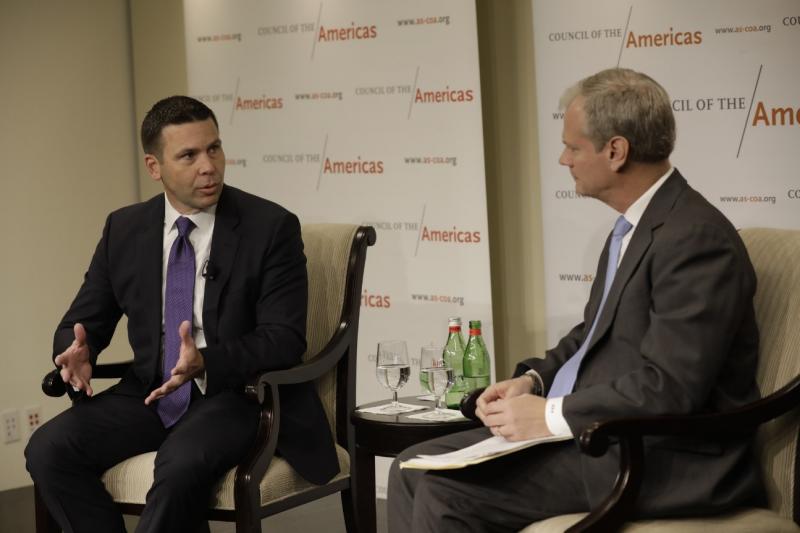A huge shift in the populations seeking entry into the United States is challenging CBP’s ability to process the migrants where less than 20 percent of the arrivals have a valid asylum claim, according to Commissioner Kevin K. McAleenan.
“There’s been a significant demographic change,” he explained, during a forum of the Council of the Americas in Washington, D.C., Friday.

answers questions from Eric Farnsworth,
vice president of Americas Society/Council
of the Americas, during a forum Friday at
the Carnegie Endowment for International
Peace in Washington, D.C. Photo by
Glenn Fawcett
The council promotes education, debate and dialogue in the Americas and fosters an understanding of the political, social, and economic issues confronting Latin America, the Caribbean, and Canada. It supports open markets, the rule of law and democracy throughout the Western Hemisphere.
Traditionally, 90 percent of the aliens trying cross the southern border were single adults from Mexico. Since November, however, 59 percent of the arrivals are families with children, said the Commissioner.
Smugglers are driving the demographic change, according to Commissioner McAleenan. Within the Northern Triangle countries of El Salvador, Honduras and Guatemala, smugglers falsely tell potential migrants that by taking a child on the journey to the U.S. they will be allowed to cross the border and be released into the country.
The Commissioner said families are being exploited by some of the largest criminal organizations in the world, charging them as much as $7,000 to be smuggled across the border. “They use families as a diversion so they can transport their drugs,” he said, calling the situation both a security and humanitarian crisis.
Methamphetamines and fentanyl are constantly coming through our borders and are being used at epidemic levels within the U.S. At the same time, CBP border facilities and Border Patrol stations are designed to hold adults suspected of a crime, rather than families, he said. The solution lies in changing the law, according to the Commissioner.
Three factors are driving the migrations to the U.S.: a lack of economic opportunity and poverty, lack of food, and violence. Crop failure and draught have led to malnutrition and the drop in the price of coffee has weakened the economy. In Guatemala, the average age is 19 and “the number of jobs is about 35,000 per year, but 150,000 enter the workforce per year,” he said.
CBP is supporting the State Department, the U.S. Agency for International Development and local governments to address these root causes. The Commissioner visited Central America in September and participated in over 50 meetings with local officials in the Northern Triangle. Communities are making investments in law enforcement, airport security and vocational training, he said, and improving their ability to solve crimes. “I’m confident in those leaders.”
In building stronger economies and creating jobs, he cited how Honduras has improved operations at the Port of Cortes, so containers can be moved more efficiently with reduced border crossing time. CBP officers work alongside Mexican customs officials in moving cargo across the border with just one inspection.
Overall, solving the problems that lead to mass migrations hinges on establishing partnerships and providing training that changes the culture of organizations where historically there has been corruption. CBP’s goals, the Commissioner said, are aligned with Mexico and the Northern Triangle nations not only in the development of Central America, but also in targeting transnational criminal organizations.


